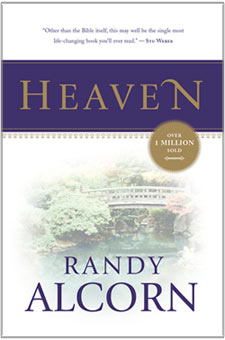Question from a reader:
Have you read Mitch Albom’s popular book The Five People You Meet in Heaven? What do you think of it? I found it very touching.
Answer from Randy Alcorn:
Yes, I’ve read it. I mention it briefly in my book Heaven.
Like you, I found some of it touching and I kept telling myself “this has some real truth in it...BUT only if you connect it with Scripture’s larger body of truth.” By isolating it from OTHER true things, including the central reality that we cannot get to Heaven in the first place without Jesus, the book ends up being very misleading. By implication more than direct teaching it leaves some seriously heretical impressions.
Discerning Christians with a strong biblical theology can pick out the good and toss the bad. Unfortunately, most who read the book (and see the movie) will not do that, and indeed may be incapable of doing so. They will tend to swallow not only the true parts or the conditionally true (if....then) parts, but all of it, including the false assumptions and wishful thinking that underlie it.
So while the book contains some good things, the message (whether spoken or unspoken) about how you GET to this Heaven in the first place, and the entirely absent fact that the central figure of Heaven is the God of the Bible, puts the message way off base. This is why I sadly had to say this in my book Heaven:
Many contemporary approaches to Heaven either leave God out or put him in a secondary role. The Five People You Meet in Heaven, a best-selling novel, portrays a man who feels lonely and unimportant. He dies, goes to Heaven, and meets five people who tell him his life really mattered. He discovers forgiveness and acceptance. It sounds good, but the book fails to present Jesus Christ as the object of saving faith. Instead, it portrays a Heaven that isn’t about God, but about us. A Heaven that’s not about God’s glory, but our healing. And a Heaven that’s not about God’s unfathomable grace to undeserving sinners, but our goodness and self-importance. Man is the cosmic center; God plays a supporting role. This sort of Heaven, of which the Bible knows nothing, is a place of therapeutic self-preoccupation rather than preoccupation with the person of Christ.
Here are some further thoughts. Our theology tends to come from whatever we trust. Albom has unfortunately not trusted Scripture, but a hodgepodge of pop psychology and pop religion, with a little New Age thrown in. The fact that he has some good insights along the way makes the heresy all the more effective. Hand somebody undisguised rat poison and they won’t eat it. Cover it in chocolate, and they likely will. All effective heresy contains much that is true—it’s the chocolate that deceives us into eating the rat poison.
1 Timothy 4:1 says, “The Spirit clearly says that in later times some will abandon the faith and follow deceiving spirits and things taught by demons” (“doctrines of demons” in some translations). False doctrine is more than errant human opinion. Often its source is in another world, where evil spirits label to deceive us. Ironically, demons know true doctrine better than we do—making them all the more effective in obscuring and twisting it: “You believe that there is one God. Good! Even the demons believe that—and shudder” (James 2:19).
A remarkable statement is made in 1 Timothy 6:3-4: “If anyone teaches false doctrines and does not agree to the sound instruction of our Lord Jesus Christ and to godly teaching, he is conceited and understands nothing...”
A rather blanket condemnation, but nonetheless what Scripture says. What strikes me is the first description that comes to Paul’s mind, as prompted by the Holy Spirit—before all else, a teacher of false doctrines is regarded as CONCEITED. Why? I think it’s because he chooses his preferred doctrines over God’s revealed doctrines. And that is not just error, it is the ultimate conceit. It says “I trust my own opinions and perspectives (which are often identical to the current drift of a person’s culture) more than I trust God’s.” Hence, he is putting himself in God’s place. He makes himself God.
The judgment upon the false prophet is serious indeed (capital punishment in Old Testament). The burden laid on Bible teachers in the New Testament is heavy: Titus 2:1 says, “You must teach what is in accord with sound doctrine.” That’s a good verse to put on our computer monitors. And hence, James says, “Not many of you should presume to be teachers, my brothers, because you know that we who teach will be judged more strictly” (James 3:1).
There is a humility in submitting to God’s revealed truth even when we do not like its implications, or wish that it were otherwise. The doctrine of eternal hell is a prime example—I do not “like” it, but I accept and submit to it, and recognize any of my instincts and arguments against it are but straw. Jesus spoke more of it than anyone—who am I to suggest some way around a doctrine that Christ embraced and taught? And consider the vested interests that demons have in our not believing in Hell! If I were to join many people in saying “there is no eternal hell” or “no one will go to hell” I might fancy myself civilized and compassionate, but in fact I would simply be a heretic, trusting in my insights and doctrines over my Lord’s—and hence proving that I or my culture, not He, is my real “Lord.”
 Albom’s book is fiction. Many imagine that nonfiction is teaching and fiction is not, hence that nonfiction relates to doctrine (true and false) but fiction doesn’t. We know better. Fiction is but a different form of teaching, less didactic of course, but sometimes even more effective. Fiction has a Trojan Horse effect, wherein the novelist’s worldview is allowed unguarded entry into the gates of the reader’s minds. Often that worldview subversively (for better or for worse) comes out and does its work under cover of darkness, sometimes overthrowing the mind that opened its gates, having no thought to what was hidden within the story. Perspectives are changed, belief systems are modified, sometimes radically, regardless of the author’s intent.
Albom’s book is fiction. Many imagine that nonfiction is teaching and fiction is not, hence that nonfiction relates to doctrine (true and false) but fiction doesn’t. We know better. Fiction is but a different form of teaching, less didactic of course, but sometimes even more effective. Fiction has a Trojan Horse effect, wherein the novelist’s worldview is allowed unguarded entry into the gates of the reader’s minds. Often that worldview subversively (for better or for worse) comes out and does its work under cover of darkness, sometimes overthrowing the mind that opened its gates, having no thought to what was hidden within the story. Perspectives are changed, belief systems are modified, sometimes radically, regardless of the author’s intent.
Hence, not just pastors and seminary instructors, but novelists (I have written six novels) are the teachers of James 3:1 who will be judged more strictly. Albom’s novel very effectively teaches theology—it is BAD theology for the most part, it is false doctrine rather than true, but it is doctrine nonetheless, and powerfully shapes the reader’s beliefs.
This is why I encourage all Christians, including fiction writers, to study of sound doctrine. It will prove of strategic and eternal importance to ourselves, our readers, and most importantly, our Lord.
For more information on the subject of Heaven, see Randy Alcorn's book Heaven.



